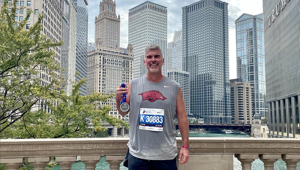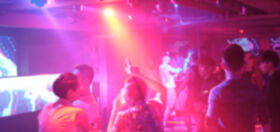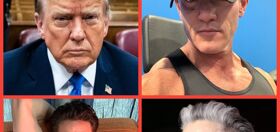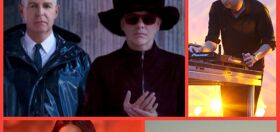Steve Grand‘s Americana-infused debut single “All-American Boy” has become something of a gay Fourth of July anthem. But the years since its 2013 release haven’t been easy the singer-songwriter. The first rush of notoriety that accompanied the song hit Grand hard.
The video for the track went viral, and with that success came a label Grand hadn’t anticipated. Headlines across the Internet touted him as “America’s first openly gay country star.” He struggled publicly with the disproportionate attention he got in LGBTQ media for his heartthrob looks and sculpted physique compared to his music. He found himself on what seemed like a slippery slope toward alcoholism, and so, a few years ago he quit drinking. He dealt with a significant break-up and the loss of close family members.
All of those struggles went into the making of his new album, Not the End of Me, out July 6. Like his debut, Grand stresses that this is not a country album. He’s taken a turn into more somber singer-songwriter territory on an album dominated by lush guitar and piano-driven tracks seemingly designed for long summer drives with the top down.
Currently prepping for his summer residency at Provincetown’s Art House, Grand took a much-needed break from packing in the 97-degree Chicago heat to chat about Not the End of Me. And in case you were wondering, the “All-American Boy” prefers not to dwell on the miserable and divisive state of American politics. At the moment, he’s all about moving forward.
How about we take this to the next level?
Our newsletter is like a refreshing cocktail (or mocktail) of LGBTQ+ entertainment and pop culture, served up with a side of eye-candy.
In addition to your P-town residency, you’re also touring this summer, right?
Yeah, I’ll take this album wherever it needs to go. For the first time in five years I took some time off from traveling to finish the record. I was taking too long on it. I always have trouble saying no [to gigs] because I feel so lucky to be getting work at this point. It’s something I never want to take for granted. I finally had to tell my booking agent, for a couple months let’s keep my travel light so I can finish the record. If I get shows on the weekend I’ll still take those. It takes, like, a full day to get in and out of P-Town so it’s gonna be a hustle this summer. But honestly, it’s so much better than the alternative. Being busy, I do so much better, I’m so much happier and I stay out of trouble.
Well, performing live must be so much fun as well.
Oh, yeah. It really is. I always tell people, you really, really have to love it, because it’s such a small percentage of what you get to do. The hassle of traveling, the airline losing your baggage—you really have to love it because it’s only one percent of the time, but it makes it all worth it. I’m really more of an introverted guy, believe it or not. I have a lot of social anxiety. But when it comes to being onstage, having an audience, I just come to life. I just love being able to do it.

It sounds like you’re in a very different place now than when you released your debut album.
Yeah, naturally with growing you learn a lot about yourself. You go through things that are difficult, and in a lot of instances, you start to realize where maybe you can be your own worst enemy. You stop pointing fingers elsewhere. You start looking within and seeing what you can really change to have a better life. Things took off so quickly for me five years ago when my first video came out. My head was spinning. I’d spent my whole life trying to figure out how to get people to care about my music, and when it finally happened I realized that I’d spent no time thinking about what to do on Day 2. And I really don’t think there’s any way to ever prepare someone for that, let alone a guy like me. I grew up in the suburbs. I didn’t have any connections to the music industry. I just did it all myself. It was scary. On a professional level, I didn’t know what I was doing. I was 23 and there was still a lot of my own insecurities and demons I had to work through. It’s hard when you’re working through that stuff and you have to keep on a public face and people start having opinions about you. I don’t think humans–we haven’t evolved to know what to do with having thousands of people sharing their thoughts about us on Twitter. I think the human psyche is still trying to figure out how to navigate that.
Most, if not all, new artists deal with the unexpected pressures of that first rush of fame. But do you think it was unique for you as an out gay artist, and as someone who became a sex symbol in a lot of ways?
Perhaps. It’s hard to say because I don’t know what it would be like to be someone else. My experience has always been my own. A question like, “How has being gay affected the way people in the industry treat you?” Well, I was out from day one. I made a video where I was jumping into a lake and kissing a guy, so it was all out there. I really have nothing to compare it to. With those kind of things that I have no control over, I’ve been pretty good about just letting that go. It is what it is. I’m dealing with the cards I’ve been dealt and I’m learning as I go along.
How did your experience of the first album and the pressures and side effects that came with your early success affect your approach to making “Not the End of Me”?
This album was just a giant exercise in catharsis for me. I started writing music when I was 11 or 12 because I was going through adolescence feeling like I was a weird kid. I was not really understanding my sexuality, and it was a way to make myself feel understood. It was very therapeutic. Even more so than the ones on the first record, these songs are very personal. They’re dark because I went through some dark things. I dealt with a lot of my own internal demons.
Generally, the pressures that I felt have played into what I’m feeling and it gets translated into something on the record. These songs are like pages from my diary. Every one reflects what I was feeling at a very specific moment in time. So a lot is stuff that I’ve already dealt with and let go of. This is kind of like my final way of dealing with it and putting it to rest. That’s how I deal with things. It seems I deal with things more effectively when I’m able to communicate them in a piece of art.
Unlike the last record, I wrote every single song on this album, all on my own, all words and music. I had some co-writers for two or three songs on the last one, but this is even more me. I even built the studio by hand that I recorded in. Now I do most of the production work myself too. It’s really a part of me.

Related: Steve Grand gets brutally candid about his years of addiction
So, I want to talk about some of the things you went through that inspired this new music. You mentioned that you got sober. What can you tell me about that and what precipitated that decision?
I’m happy to talk about that. I’m always a little hesitant because I don’t think it got that bad for me, where I could be, like, considered an addict. I know addicts and what they deal with. So I don’t want to try to claim that experience. I’m really fortunate that I have a really solid, loving group of people around me who really kept me from totally destroying my life. But I will say that my behavior had started—it became clear to me that if I kept up what I was doing I was going to destroy myself. I had that self-destructive tendency. So these last few years I’ve really taken a look at that. I found myself apologizing for my behavior more. I found that no matter how much I would limit my alcohol intake before the night started, as soon as it hit my lips I wouldn’t be able to say no. I was always able to rationalize drinking more. And then I was able to rationalize drinking in the morning because I would be stressed. So I would do a shot or two in the morning to get through my day. I realized I started to be embarrassed that there was alcohol on my breath. All of that lead to me being like, I’ve tried to moderate and it’s clearly not something that is working for me. I don’t want to pass any judgment on people who are able to drink, but it wasn’t for me. Now that I’ve spoken about it, I realize there really are a lot of sober people out there, specifically in the gay community. There’s a lot of guys that I meet after shows who say they’ve been sober for 20 years. That really was inspirational to me. I think there’s a lot of people who are closet sobers. For people feeling like they’re going to miss out on things, if you have to stop drinking because it’s really not working for you, I would say there are more people out there that are having sober fun. And sure, it’s not the same experience. But you gotta learn what works for you, and that’s what I’ve done.
So it’s been two and a half years since I’ve had a drink. I’ve never done any hard drugs—I had the good sense not to do that. I saw how that destroyed people. Thankfully I never went down that rabbit hole.
You have been very clear, both about this album and your first album, that you are not a country singer. I’m curious, looking back, what do you make of that initial label, “America’s first gay country star,” that was applied to you.
It’s just another one of those things that made me realize that you’re going to be seen the way you’re going to be seen. I don’t see myself that way, but clearly other people have. That initial labeling of “gay country” was a really pithy headline that I wasn’t really anticipating. It’s just one of those things! I make sure that when I’m about to go onstage, I always tell the person announcing me, Don’t announce me as a country singer. Just, “singer-songwriter Steve Grand.” It’s not that I’m afraid of the label. I love country and I’m obviously influenced by it, and “All American Boy,” that song was obviously infused with a little country-rock. So, it’s not something that bothers me. You’ve gotta choose your battles. If people hear it as more country, then that’s fine. My only concern is that it would keep somebody from giving my music a chance if they don’t like country. Most of it on this record isn’t country at all.
So how would you describe the sound on this record? I know you mentioned it’s a darker in tone, maybe a little more somber. It seems like there are more ballads.
Sonically it’s definitely darker. But it’s also eclectic. I play ukulele on one song. There’s a reggae-influenced tune called “Ain’t It Something.” Overall, when I think of the songs that stand out to me, it’s first and foremost a singer-songwriter album. It’s all about the songs for me and the words. The production I build around that is, like, dark pop, Americana-infused.
I want to talk a little about the challenges of being a self-funded independent artist. There was so much buzz around your debut single that I think it will surprise most people that you still haven’t signed to a label.
When I first started this, I was really set on doing this on my own because I’d lived in Nashville for a year and I’d heard a lot of horror stories about record labels. And with the Internet, with YouTube, I saw that I could get my music heard by people just by making something that was really good and compelling. So that’s what I put my efforts into. I really just worked on my songwriting. I would try to reach out to different producers, but until you really have any kind of success no one wants to listen to you. So, one of the many great things about the build-up to my first record is I had made a little bit of a name for myself, so the first thing I did was email all these famous producers. “You may have seen me on Good Morning America. I’m looking to make a record. I love your work. Would you be interested in working with me?” Most of them didn’t respond, because they don’t need to. But a few did get back to me, and one ended up being Aaron Johnston, who was the producer for The Fray’s first two records. So I thought he’d be a good fit and a couple months later I was in LA, staying at my friend’s house and going into the studio every day.
It’s really important to me to be an independent artist. There’s definitely a lot of challenges…
Related: Steve Grand finds even smaller underwear for Independence Day
But I imagine there are also a lot of advantages.
Yeah, definitely. But, obviously, the trouble is you don’t have all the contacts and you’re not going to get radio play if you’re not with a major label. That’s the way it is. The labels are all in bed with the stations. I do a lot of negotiation on the creative and the business end. My hand is really in everything. I’ve learned about a whole industry and built my whole small business around it, which is something I never anticipated. I just wanted to make music. But it’s been fun. I do have full creative control. When I do good things it frees really good—but when I do bad things I only have myself to blame!
What’s next for you this summer?
I’m definitely going to be traveling. I’ll take this album wherever it gets me. My fans have been so incredibly supportive and patient with me through this whole crazy journey. Obviously, I couldn’t do what I love without them. I’m able to do what I do because of their support. I’m gonna keep performing, and I want to start coming out with more new music more frequently. I feel like I’m in a good headspace now and I’ve said a lot of things that I needed to say on this record about my experience the last couple year. I just want people to know, even though it’s a pretty dark album, there’s a sense of resilience. I want people to hear that and give people hope and strength, no matter what you’re going through.
We all suffer to some degree, and there’s no easy way out of this life for any of us. So you have to have hope and be strong. Keep on pressin’ on.





















Chrisk
Ah ok. 1% about any addiction problems and 99% PR for new album. Clickbait!!
Chrisk
This is right out of the Aaron Carter how to get attention for my music handbook.
Josh447
The article is true to the title, no clickbait here. Just a really good guy making his way in the world. His achievements are Integrous and noteworthy as is his personality. To compare him to Carter is completely off base and totally unjustified.
GetOffMyInternets
Wow. Steve finally has clothes on! I just wish I could say he was as talented as the gay rags trying to push his music on us want us to believe, or maybe I’m not impressed because he’s usually in underwear or a bathing suit and then complaining he’s objectified.
Good job on sobriety. It’s not easy getting there, here’s to many more days of it Steve.
Michael1999
I’m a big fan of yours and I’m so glad you’re doing much better.. you are a great inspiration to young people my age (19). I listen to your music all the time.
ousooner1997
I just came here to see all the bitchy queens and their negativity jealous comments on someone making it while they sit around bitter and jaded.
Heywood Jablowme
We’re all glad that YOU are not bitter and jaded.
OzJosh
Yeah, it’s staggering to see so much bile for someone who generates an entirely positive image, seems intelligent and motivated and has done nothing and nobody wrong. And attacking a musician for being a relentless self-promotor is a bit like attacking a sprinter for running fast; it’s central to the job.
Brendancrd
Fantastic Steve. Qapla dude. Your new you artistic album sounds wonderful deep soulful. I’ll track down a copy definitely. Awesome achievement. Relate to how it’s been difficult for you. Be Proud of how you’ve come through your struggles and anxts music is a great way to express yourself artistically. Relatable. Many gays men can relate to your social anxieties. But don’t have your gift. And you ARE incredibly handsome; own that! God’s gift! Embrace your experiences with humility and sincerity and gratitude. It Helps people wanna listen to your message music of hope. Gawd knows America needs hope right now, right?!
So in a way your helping me/us understand we’re not going through this stuff alone. Read your fascinating story interview on Queerty.com. Bless you music dude. Great job ???
batesmotel
He’s very expressive and a talented guy who loves his music. Would be nice if a major label would sign him and help get his music out there in a bigger way. At least that doesn’t stop him from doing what he loves.
Randall
So glad to read a great interview with Steve! Big fan here, I’ve seen him perform live a few times and he is awesome, very talented! I’m glad he took control of his drinking before it got any worse. I’m very much looking forward to hearing the new album. The more personal and honest the writing is, the better it is and it reaches people more deeply. A record label should snatch him up and offer him a good deal. His music deserves to be heard on a larger scale.
nitejonboy
I didn’t recognize Steve Grand with all his clothes on!
Terrycloth
Country music has turned into Country Rock..I hope Steve can change his music to fit that genre…
greenchemical
When Jussie Smollet released an album not a single peep! But here comes a “good looking white boy” release his album and article bombardment. Also a more mainstream artist Frank Ocean releases new music and also NOT A SINGLE PEEP. Queerty you guys gotta get your act together and actually promote all LGBTQ artist not just the pretty white ones.